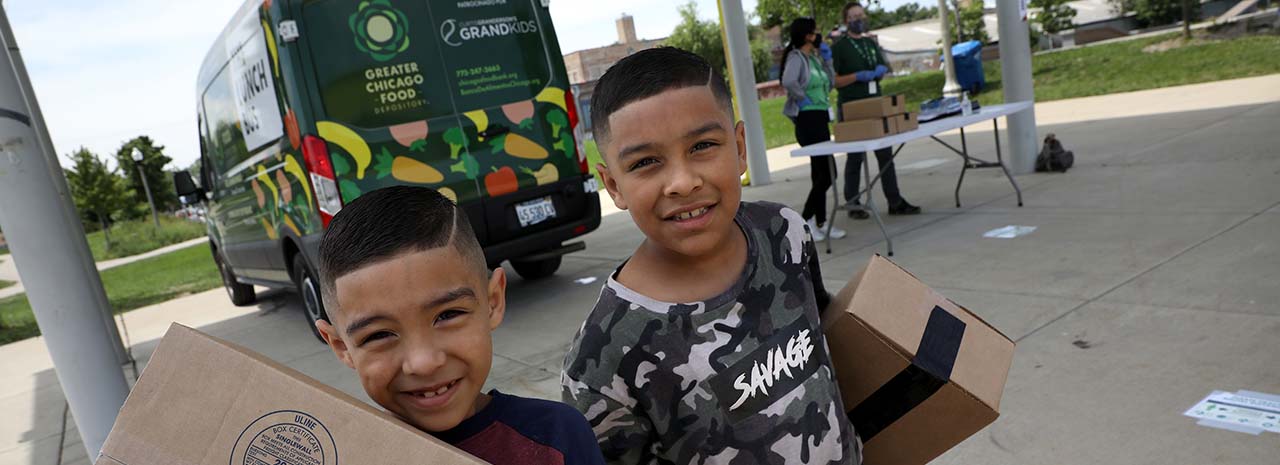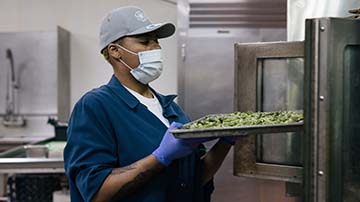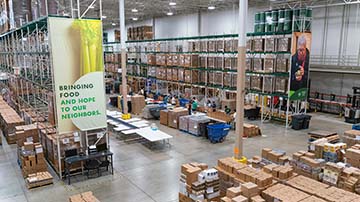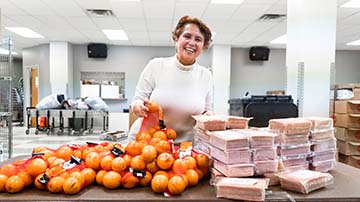
Feeding kids during a year of disruption
The high school student has been a part of The Barreto Union League Boys and Girls Club since he was six years old. For decades, the club has been an after-school haven for kids like Bowers in the Humboldt Park neighborhood. Once the pandemic hit and schools closed for the 2020-2021 academic year, it also became a remote learning site for him and dozens of others whose parents worked outside of the home.
Barreto has always provided children with needed after-school meals. But the transition to remote learning put many kids at risk of losing critical free breakfasts and lunches they would have otherwise received at school. In partnership with the Food Depository, Barreto and many other youth program sites stepped in. In addition to offering a safe, socially distanced space to learn, students also received nutritious meals throughout the day to nourish their bodies and minds.
“When you eat your three meals throughout the day, it helps you work better, move better, operate better. Keeps you more awake and focused.”
Jacob Bowers, high school student
Unfortunately, skyrocketing levels of child hunger during the pandemic means fewer kids are getting the nourishment they need to learn and grow. Feeding America estimates that 13 million children, 1 in 6, may experience food insecurity due to the economic impact of COVID-19. Nationally and here in Cook County, Black and Latino children are disproportionately affected.
As a result, our work with youth meal partners this fiscal year became more important than ever. The Food Depository partners with park districts, community centers, libraries and other community groups to provide children with year-round access to nutritious meals. In fiscal year 2021, the Food Depository distributed more than 700,000 meals to children across 181 partner sites in Chicago and Cook County
Other Food Depository programs adapted to ensure children and families had access to food. Though most of our Healthy Student Market distributions at schools were interrupted during the first year of the pandemic, those that were able to reopen changed distribution models to safely connect families with the food they need. The Cicero West and East elementary schools, for example, switched from allowing parents to come inside the school to pick out their groceries to outdoor pickup of prepacked bags and boxes.
Summer is always a time of heightened concern for child hunger. This year, with continued flexibility in federally-funded summer meals programs, we partnered with more than 166 sites and offered three Lunch Bus mobile distribution routes. From June to August, we distributed nearly 389,000 meals to children and their families to help when school was not in session.
New and expanded federal nutrition programs also provided an important safety net. The Food Depository worked to educate eligible families about how to enroll in programs like the new Pandemic EBT (PEBT) program, which provided groceries to families whose kids were no longer able to access free meals at school. Our advocacy team distributed PEBT marketing materials in six different languages – English, Spanish, Polish, Mandarin, Arabic and Urdu – in collaboration with community-based organizations across the state. As a result, about one million Illinois children and their families were able to access additional grocery assistance while schools were closed.
Elevated child hunger has been another heartbreaking outcome of the pandemic. Your generous support of the Food Depository allows us to provide food for children and families where they live, learn and play.
STORIES
- Food pantries continue to meet elevated demand
- Prepared meals reach neighbors with unique needs
- Food Depository network expands to support neighbors in need
- Prioritizing food equity
- Through ongoing crisis, volunteers rise to the challenge
- Strong anti-hunger policies lessen crisis
- Feeding kids during a year of disruption
- Paid job training programs provide new start
- Serving a heightened need




